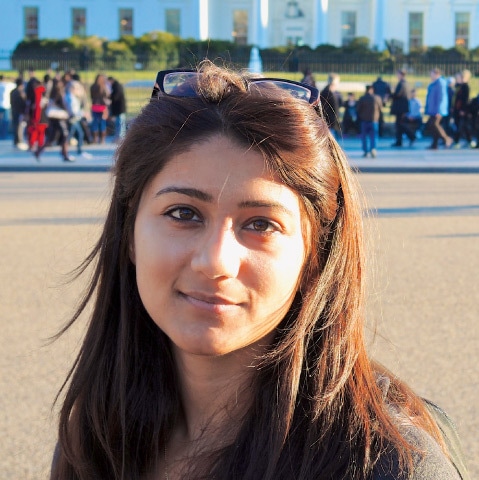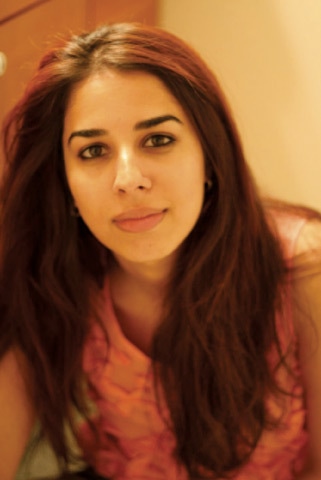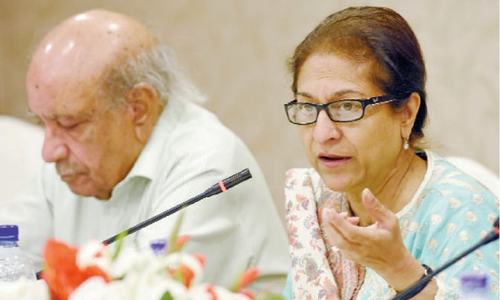
For Asnia Asim, who grew up on army bases across Pakistan, moving to Washington was a no-brainer.
It wasn’t the first time she would be away from home in Islamabad. Asim had lived in a girls’ hostel for four years while pursuing business school in Karachi. Her father, a retired army officer, and mother, an educator, were broad-minded and trusted her. But Asim had high academic and professional ambitions and wanted to travel. After she won a prestigious international essay competition run by the World Bank, an offer to work at the Bank’s headquarters in Washington became too good to pass.
The initial daze of moving to a new city and starting her first job took a while to settle. Once it did, living alone in an apartment turned out to be a vast change from life at a crowded Karachi hostel.
Often unable to find personal and professional independence back home, more single Pakistani women are choosing to make their home in the West — alone.
Asim became depressed, and would often find herself daydreaming about her life at the hostel. In America, living alone was ‘true’ living alone, she said.
She also worried about the future. She was in her mid-20s, unmarried, and living alone, an uncommon combination for a Pakistani woman. Asim had been raised in a relatively liberal household, but some traditions were hard to let go.
In Pakistan, where 97 percent of the population is Muslim, women have more freedom compared to orthodox societies like Saudi Arabia. However, norms borne out of a mix of religion and South Asia’s own patriarchal cultural heritage dictate most women’s lives. Marriage and family are considered integral to women’s identity, and life for single women choosing to live independently is fraught with challenges.
Beena Sarwar, a journalist and documentary filmmaker from Pakistan whose work focuses on gender and human rights, sees a slow acceptance of women venturing out on their own in Pakistan.
“I think there is a growing phenomenon of more women moving to other cities within and outside Pakistan,” says Sarwar.
But she also sees multiple types of pressures applied on women even after they win family approval to live on their own.
“There’s a lot of public or social pressure on these women’s families, even when they have reconciled to the idea themselves,” Sarwar says. “There are few social boundaries in our culture. Women’s life choices — be it marriage or having kids — are common conversation points.”
Sarwar also says it’s important to note that the idea of living alone is alien to the traditional, joint living arrangements in Pakistan.
“Privacy and personal space are Western, modern concepts. Pakistani society is transitioning from a rural, patriarchal culture where there is no sense of personal space,” she says.

The Migration Policy Institute reports that there are about 273,000 Pakistan-born immigrants in the US. While it is safe to assume that a majority of Pakistani women migrate with their families, in recent years, international scholarship programmes like Fulbright and others funded by Pakistan’s Higher Education Commission have given more Pakistani women the opportunity to travel abroad for education. The foundation that manages Pakistan’s Fulbright programme, however, did not respond to requests for gender disaggregated data on its scholars, though its eligibility criteria strongly encourage women to apply.
Too educated to find a match
Even the most broad-minded of parents of Pakistani women living alone, aren’t immune to societal pressure.
“My parents constantly felt judged by their peers who wondered how they could let me get on with my life,” Asim says.
They would in turn express their frustrations to Asim, who soon left the World Bank to attend graduate school at Brandeis University, and then found work as a financial consultant in Boston. She didn’t return for seven years to keep her visa intact. Her parents thought it was because she had become too Americanised, she says.
For Shehla Wynne, whose parents fully supported her decision to move to America 10 years ago to study biochemistry, the pressures began after she changed her original plan of returning after her Masters. She was accepted into a doctorate programme at Georgetown University, and after earning a PhD, decided to attend law school. On each trip home, she met family members who would inquire how she would ever find a suitable match, now that she was “too educated.”
For most Pakistani women, moving to America to live alone can be a vast social adjustment. For Asim, a major challenge was religion. She expected an unquestioned acceptance of her religious bent but in her new surroundings, she found herself in a minority.
While her parents never forced her to return, Wynne says she understood the pressures they put up with at home on her behalf.
“There was talk about when was I going to stop chasing my career and settle down. My parents were super-supportive but there was constant negotiation on what I could and couldn’t do,” she said.
That negotiations began much before coming to America for Saima Firdous, a resident physician at Tufts Medical Center in Boston. Firdous is from a land-owning family in Dhamial, a small village in Punjab. She went to medical school in Rawalpindi. But unlike most Pakistani women who travel to the US to study, Firdous came from a family where women’s education was rare. Neither her mother, nor her three sisters had gone to school.
“We had no tradition of educating girls,” she says. “From the beginning I had to constantly prove that I was a good girl and they could trust me.”
While going to college in Pakistan was a hard-won battle, Firdous was an outstanding student and her family became proud of her. But when she decided to study in the US, her parents couldn’t understand why she took that decision.
“They just couldn’t see the need for me to go abroad,” she says.
To make matters worse, her fiancé, himself a US-qualified physician, refused to let her pursue a career after marriage. Firdous broke the engagement and won her family over on the condition that she would live with relatives in Minnesota. She later acquired a fellowship to Harvard and moved to Boston.
Adjusting to a new normal
For most Pakistani women, moving to America to live alone can be a vast social adjustment. For Asim, a major challenge was religion. She expected an unquestioned acceptance of her religious bent but in her new surroundings, she found herself in a minority.
“I realised I was praying now not just because everyone was doing it. It was a strange test of loyalty.”
Asim eventually found her calling as a poet. She went back to graduate school once more to study poetry. Now living in Houston with her husband, a Lebanese immigrant whom she married two years ago, she has published poems that speak of her experiences as an immigrant. She uses her writing to “understand the cultural and personal conflict that sprouts from geographical displacement.”
“I don’t think it ever ends. You’re constantly negotiating a culture and the negotiation continues when you get married or have children,” she says.
Amena Saiyid, 44, an environmental reporter at Bloomberg News arrived from Pakistan in 1992 to study chemistry at the College of William and Mary. While she, too, came from a highly-educated family, Saiyid still found living in America a big adjustment.
“Sharing a room with a stranger from a completely different culture, and who may have preconceived ideas about you was pretty tough,” says Saiyid.
Firdous also recalls her first-ever experience of living with a roommate as challenging.
“I come from a religious family and didn’t know much about other religions, so I wanted to live with a Muslim woman.”
While she found a Muslim roommate, it didn’t quite work out.
“My Algerian roommate threw all of my stuff out one day because we couldn’t get along,” Firdous recalls.
But both Saiyid and Firdous say that the best part about coming to America was meeting people from other cultures. Saiyid believes her experiences challenged her preconceived notions about nationalities which are often hated in Pakistan, like Israelis or Indians.
For Wynne on the other hand, the most significant change from home was freedom of movement.
“I led a very sheltered life in Pakistan. I had a strict curfew. Being able to have male friends and work late were big changes for me,” she says.
During her initial years, Wynne would visit home every year. But each trip pushed her towards staying. That she didn’t want to return home upset her initially, but she appreciated her newfound self-reliance. It came in especially handy when her sister, also settled in the US went through a divorce and came over with her daughter to stay with Wynne for several months. She said her independence prepared her to help her family through the difficult time. She knew what needed to be done and had the community connections to help take care of her sister and niece.
“Those connections were my people, and this was life that I had built all on my own,” she says.
For Asim, who married in her 30s, the biggest change was the evolution of her conceptions about marriage and fears of remaining single that had been cultivated in Pakistan. It took her eight years of living alone to realise that marriage could be much more than just a “safety net.” While she believes that America has its own stereotypes for women, Asim finally escaped the constant questioning back home on why she hadn’t found a match yet during her years of being single.
“For me, living alone made me realise that no one would come and save you,” she says.“You save yourself or perhaps you save a man."
Published in Dawn, EOS, February 26th, 2017












































